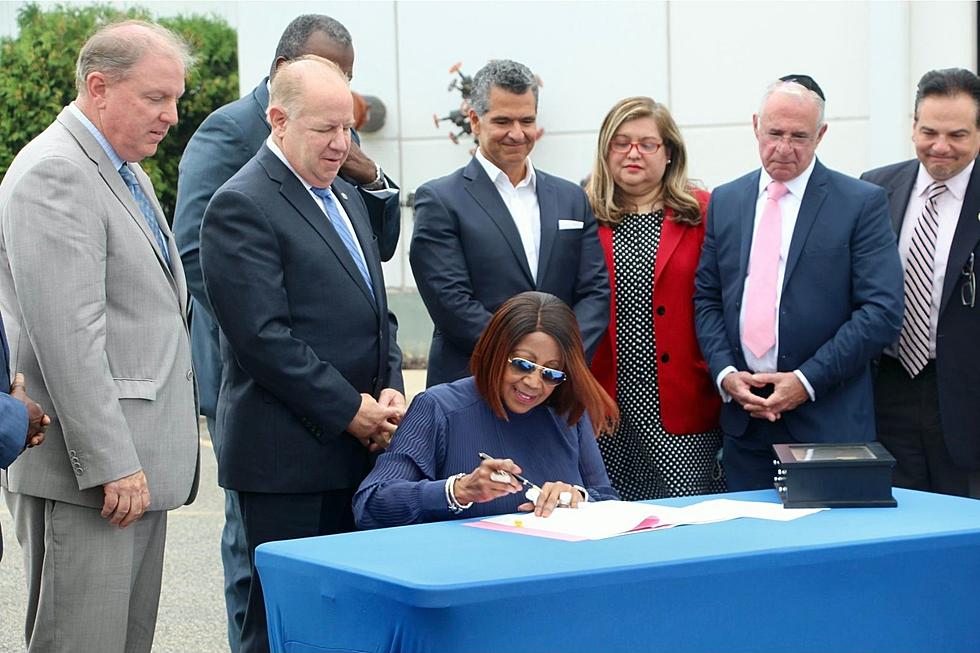
NJ Revamps UEZ Program – But the Sales Tax Discount Stays
ELIZABETH – A new state law enacted Tuesday revamps the Urban Enterprise Zone economic development program, known mostly for the half-off discount it provides off the sales tax in parts of 37 municipalities.
Fear not, that part of the program is staying. So are tax-free purchases for businesses on capital equipment, facility expansions, and upgrades, though benefits would phase out for larger businesses.
One of the biggest changes is that the law reinstates state money for ‘zone assistance funds’ that support local economic development efforts for the first time in 10 years. It appropriates $42.5 million for that purpose.
Lt. Gov. Sheila Oliver signed the bill into law as acting governor, while Gov. Phil Murphy is on vacation in Italy. Oliver – who is commissioner of the Department of Community Affairs and will be chairwoman of the UEZ Authority – said the law is a long time coming and was a priority of the administration.

“For the first time in 10 years, UEZs will receive flexible economic development funds to start grant programs, revolving loan programs, clean and safe initiatives, targeted public safety interventions in commercial areas and more,” Oliver said. “This is a boon for our mayors and governing bodies at the local level.”
“The reform also requires new plans to be put in place by municipalities, helping to ensure that the funds will be spent responsibly and according to a comprehensive plan, as opposed to just one-offs,” she said.
Currently, there are 32 zones covering parts of 37 municipalities. They are home to nearly 7,300 UEZ-certified businesses. They are all set to expire between 2023 and 2025 – so, in the term of the governor elected this November.
The program began under Republican Gov. Tom Kean, but fellow Republican Gov. Chris Christie was a skeptic of its effectiveness and the program withered in the 2010s. In his first year in office in 2018, Gov. Phil Murphy signed a law reinstating five UEZs that had expired and extending the program.
“This bill is a gamechanger in so many ways, but it’s reflective of what good government should do,” said Sen. Joseph Cryan, D-Union. “It’s reflective of the opportunity to make capital, jobs and opportunity available to the residents of the state of New Jersey.”
The bill signing was held outside Seafrigo USA, a cold-storage warehousing and logistics company specializing in the food industry. Seafrigo has three locations in the Elizabeth UEZ and one in Newark’s. The incentives saved it nearly $20 million in taxes in construction and operations since 2013, Mayor Christian Bollwage said.
“They’ve enabled business districts to recover during difficult times,” Bollwage said of UEZs. “Job creation, community-based development, the Urban Enterprise Zone program here in our city is proven economic and financial mechanism for promoting public and private investment.”
Huge savings like those Seafrigo reaped will be more difficult moving forward. The program is being changed to limit sales-tax exemptions to the first $100,000 of retail sales of tangible property to a qualified business for its use within the UEZ, except for supermarkets in a ‘food desert,’ with some limitations also on construction projects.
“It will leave room for small businesses to benefit from the program while phasing it out for larger businesses to whom the impact was muted,” Oliver said.
“That’s to make sure that large companies which need funding are not the only beneficiaries but small companies as well,” said Assemblyman Gary Schaer, D-Passaic. “Mom and pop companies, especially in immigrant communities.”
Leaders of chambers of commerce said the UEZ program and its shifting emphasis to smaller businesses can particularly help some of the 80,000 Black-owned and 120,000 Hispanic-owned businesses in New Jersey.
“From many perspectives, we’re still underperforming,” said John Harmon, president and chief executive officer of the African American Chamber of Commerce of New Jersey. “This particular initiative, this bill, would afford us an opportunity to get in a better place. If you have commerce occurring in communities like Elizabeth, Trenton and others, you have to potential to impact those that are at the bottom, creating more jobs, more economic opportunities.”
Census 2020: The 20 biggest places in New Jersey
LOOK: What major laws were passed the year you were born?
More From WPG Talk Radio 95.5 FM










